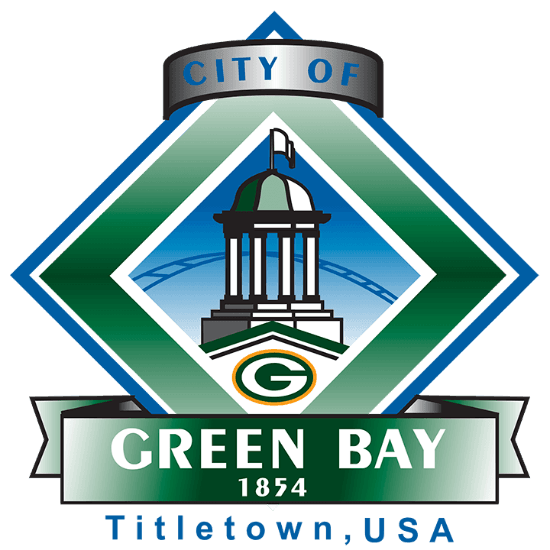Should Green Bay spend $100,000 on a rebranding initiative? Most of the City Council thinks so.

GREEN BAY – Like a meteor accelerating into a combusting spectacle, the Finance Committee's unanimous vote on a rebranding initiative in Green Bay last week turned fiery by the time it entered the orbit of City Council on Tuesday night.
For some council members, the rebranding initiative represented a sea change in Green Bay's identity, but for others, the time, effort and expense of the project was seen as frivolous compared with other more critical uses of city money.
The idea to move forward with the rebranding idea and the funding source took center stage at Tuesday night's City Council meeting.
RELATED: Green Bay makes first step toward rebranding city logo, projected to launch in January 2023
RELATED: New parking rates, election transparency, redistricting ordinance lead City Council discussion
RELATED: Green Bay residents eye ARPA dollars for crime prevention, infrastructure upgrades
Council member Brian Johnson proposed slowing down the rebranding initiative by seeking a request for proposals, or RFP, while holding the funding conversation for a future session. As it currently stands, the city plans to allocate $100,000 from a cooperative agreement with the Oneida Nation to get the rebranding process under way.
Johnson cited misconceptions around what the rebranding represents and a need to establish community engagement.

"This isn't a logo redesign. This is a branding initiative. And they're two very, very different things," Johnson said. "That's been one of the biggest misconceptions of the proposal."
Council member Jesse Brunette was opposed to the idea.
As a representative of a district that contains parcels of Oneida Nation land, Brunette said money from the cooperative agreement between Green Bay and the tribe should be used to address other community concerns.
Initiated earlier this year, the cooperative governance agreement reinstates annual payments from the Oneida Nation for city services and infrastructure improvements in exchange for the tribe moving land into tax-exempt, federally protected trusts as it seeks to reclaim 75% of its original 65,000-acre reservation by 2033. For 2021, this amounted to $322,192.
"It's not free money," Brunette said. "If we're going to spend $100,000, and we're looking at it from an economic development (perspective) and attracting employers and businesses, we ought to put that $100,000 toward infrastructure improvements, or we ought to put it toward paying down debt, or $100,000 toward violence prevention."
Brunette countered the notion that rebranding would attract residents.
He said the project should be presented at the budget hearing next November and go through the normal process, a comment that prompted Mayor Eric Genrich to clarify that the most recent budget discussion pertained to the 2022 budget.
Council member Chris Wery agreed, in part, with Brunette, saying the rebranding initiative was "not a popular idea."
"Maybe it's just that people don't have enough information but I can tell you it's not popular," Wery said. "It's worth asking if this is really necessary and — that'll be the goal here — is to make that case. I personally don't see that it's necessary right now, but I could be convinced."
As council members continued to talk about ways to adequately roll out the rebranding initiative, Brunette said the conversation smacked of an echo chamber.
"You're all talking among yourselves, trying to find a way to justify spending or looking to get a quote to spend $100,000 that, up until two weeks ago, we hadn't registered this on the radar," he said.
In a 9-3 vote, the City Council decided to pursue bids on the branding project and hold a vote on funding for a future session. Council members Wery, Brunette and John VanderLeest voted against it.
Resolutions, a new hotel permit and ARPA survey results
Meanwhile, Genrich presented the survey results on use of American Rescue Plan Act money, the $23.7 million in federal COVID-19 relief dollars for use by the city over the next three years. With over 700 votes from the public, the city weighed the four categories of spending on a five-point scale.
The overall results were as follows: 3.49 for housing, 2.73 for arts and culture, 4.06 for crime prevention and 3.78 for infrastructure. The top three write-in suggestions were essential pay, tax assistance, and trails/green space/parks/hiking etc., but tax relief won't be provided for these write-ins.
The proposed funding, per the ARPA categories, puts $10 million toward replacing lost revenue, $6 million toward negative economic effects that include affordable housing, $3 million toward water and sewer infrastructure and $2 million in public health and safety expenditures, including the police.
Council members also voted unanimously on a new luxury hotel's conditional permit, which will allow the project to exceed height limitations at 1004 Brett Favre Pass, the site of the former Brett Favre Steakhouse.
Work on the six-story hotel, a Legacy Green Bay LLC project, will begin soon after the new year, with an eye toward completing the project by 2023, according to Neil Stechschulte, the city's economic and community development director.
In other news:
Council member Barbara Dorff proposed drafting a resolution to support the Afghan refugees who recently arrived in Green Bay. "I'm asking for support from City Council for our Afghan refugees and to determine if there are additional ways we can support our new population as a City Council," Dorff said.
Brunette proposed drafting a resolution that would consider ways to allocate unbudgeted revenues from the cooperative agreement with the Oneida Nation.
Johnson also proposed drafting a resolution on creating a gun violence task force "to address all reasons related to the recent surge in gunshots fired."
All three requests for resolutions passed unanimously.
MORE: De Pere looks to community to learn about priorities for developing west downtown
Natalie Eilbert is a government watchdog reporter for the Green Bay Press-Gazette. You can reach her at neilbert@gannett.com or view her Twitter profile at @natalie_eilbert.
This article originally appeared on Green Bay Press-Gazette: Green Bay City Council argues over $100,000 cost to rebrand itself

